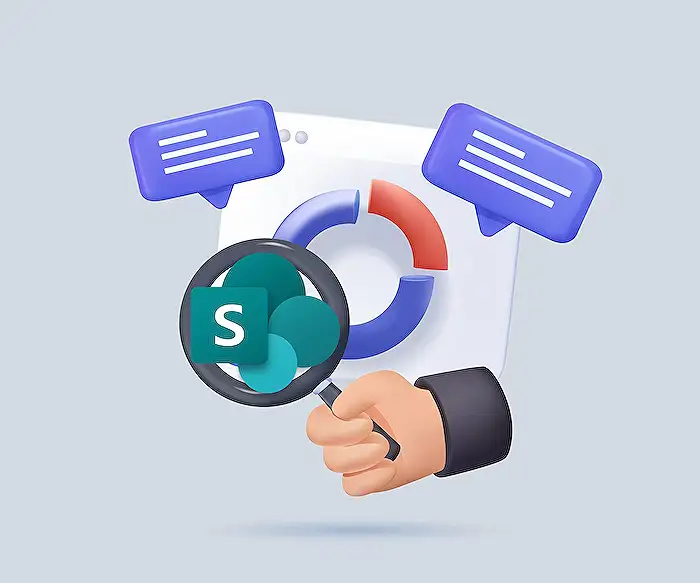
SharePoint Online
Dec 12, 2024 10:57 PM
Unlock Productivity: SharePoint Agents Now in Teams Without M365 Copilot!
by HubSite 365 about Szymon Bochniak (365 atWork)
Microsoft 365 atWork; Senior Digital Advisor at Predica Group
SharePoint Agents, Teams, M365 Copilot, Copilot Studio, Microsoft 365 Fundamentals, Microsoft 365 Champion
Key insights
- SharePoint Agents: AI-powered assistants that help users manage information within SharePoint sites. They can be integrated into Microsoft Teams to enhance collaboration.
- Access Without M365 Copilot License: Users can create and use SharePoint agents through Copilot Studio capacity packs or Pay-as-You-Go meters. A promotional offer provides 10,000 free queries for unlicensed users from January 6, 2025, to June 30, 2025.
- Integration with Microsoft Teams: SharePoint Agents can be shared via links in Teams. Team members can interact with agents directly in chat by @mentioning them, promoting real-time collaboration.
- Admin Controls: Administrators manage access to agents by setting permissions on .agent files and controlling user access through licensing. This ensures only authorized users can interact with the agents.
- Copilot Studio: An end-to-end conversational AI platform allowing the creation of agents using natural language or a graphical interface. It supports multiple languages and integrates Power Virtual Agents features.
- Generative AI: Integrated within Copilot Studio, it aligns with responsible AI principles like fairness, reliability, safety, privacy, inclusiveness, transparency, and accountability.
Introduction to SharePoint Agents and Microsoft Teams Integration
SharePoint Agents are AI-powered assistants designed to help users efficiently manage and access information within SharePoint sites. These agents have gained significant popularity among Microsoft 365 (M365) Copilot users, primarily due to their ability to streamline workflows and enhance productivity. Recently, Microsoft announced that these agents would be available to business users based on a Copilot Studio license and an additional trial offer. Moreover, SharePoint Agents can now be integrated into Microsoft Teams, allowing users to share and collaborate on information in real-time.Accessing SharePoint Agents Without an M365 Copilot License
One of the key developments in the realm of SharePoint Agents is the ability for users to access these tools without necessarily holding an M365 Copilot license. This accessibility is made possible through several options:- Copilot Studio Capacity Packs or Pay-as-You-Go Meters: Organizations that enable Copilot Studio capacity packs or opt for Pay-as-you-go meters can allow their users to create and use SharePoint Agents. This setup facilitates the creation and utilization of agents within SharePoint, even for those without a direct Copilot license.
- Promotional Access: From January 6, 2025, to June 30, 2025, enterprise tenants with 50 or more M365 Copilot licenses will receive 10,000 free SharePoint agent queries for unlicensed users each month as a trial. However, after this promotional period, users without an M365 Copilot license will need to secure the necessary licensing to continue using these agents.
Integrating SharePoint Agents into Microsoft Teams
Integrating SharePoint Agents into Microsoft Teams is a significant advancement, as it enhances collaboration and information sharing within teams. Here’s how it works:- Sharing Agents: Agents created in SharePoint can be shared via links. When shared in Microsoft Teams, team members can interact with the agent directly within the chat by @mentioning it. This feature facilitates real-time information sharing and collaboration, making team workflows more efficient.
- Access Permissions: It’s crucial to note that interacting with shared agents in Teams requires appropriate permissions. Users must have access to the SharePoint content that the agent references. Furthermore, without an M365 Copilot license or the aforementioned capacity packs, users may not be able to utilize these agents fully.
Managing Access to SharePoint Agents
To effectively manage access to SharePoint Agents, administrators play a crucial role. They can control who has access to these agents by setting permissions on the .agent files and managing user access through licensing. Here are some key points:- Admin Controls: SharePoint administrators have the ability to enable or disable Copilot experiences on SharePoint on a per-user basis. This ensures that only authorized users can create or interact with agents, thus maintaining security and compliance within the organization.
- Licensing Management: Admins must also ensure that users are appropriately licensed to use SharePoint Agents, especially after promotional periods end. This involves monitoring license usage and making necessary adjustments to accommodate organizational needs.
The Role of Copilot Studio in Agent Development
Copilot Studio is an end-to-end conversational AI platform that empowers users to create agents using natural language or a graphical interface. This platform plays a pivotal role in the development and deployment of SharePoint Agents. Here’s what you need to know:- Agent Creation: With Copilot Studio, users can easily design, test, and publish agents that suit their specific needs. Whether for internal or external scenarios, across various industries, departments, or roles, Copilot Studio provides the tools necessary for building effective agents.
- Deployment Across Channels: Agents built in Copilot Studio can be deployed across multiple channels, including Microsoft 365 Copilot. This means organizations can utilize these agents within applications that employees frequently work in, such as Teams, SharePoint, and Business Chat.
- AI Integration: Copilot Studio incorporates generative AI, which aligns with responsible AI principles like fairness, reliability, safety, privacy, and inclusiveness. This ensures that the agents are not only effective but also ethical and secure.
Conclusion
In conclusion, the introduction of SharePoint Agents and their integration into Microsoft Teams represents a significant advancement in collaborative technology. While full functionality is available to M365 Copilot license holders, organizations can enable access for unlicensed users through Copilot Studio capacity packs, Pay-as-you-go meters, or during promotional periods. However, managing access and permissions remains a critical challenge that organizations must address to ensure seamless operation and security. With the support of Copilot Studio, businesses can create, deploy, and manage agents effectively, ultimately enhancing productivity and collaboration across teams.

Keywords
SharePoint Agents, Teams integration, M365 Copilot alternatives, Microsoft 365 tools, SharePoint automation, Teams productivity, AI in SharePoint, Microsoft collaboration.
HubSite 365 Apps